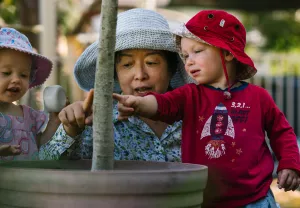Active citizenship for very young children
- Home
- Latest news
- We hear you
- Active citizenship for very young children

Active citizenship as a human right
International Human Rights Day is recognised annually on 10 December. On this day in 1948, the United Nations adopted the Universal Declaration of Human Rights. This declaration recognises the need and right to take action and stand up for our own rights and those of others. Active citizenship is about displaying values of respect and inclusion while helping others and appreciating diversity in all forms. It involves being connected to your local community.
As educators and early childhood professionals, it is important to reflect on how you promote, advocate and recognise children's rights and achievements. In this article, we will unpack how active citizenship looks for our youngest children, which includes infants. We will also explore how this can be promoted in educational programs, practice and partnerships.
Active citizenship in the Early Years Learning Framework
The Early Years Learning Framework (EYLF V2.0) describes children as competent and capable, including infants from birth. It recognises children as active citizens and influential contributors to their local and wider communities. The United Nations Convention on the Rights of the Child (UNCRC 1989) mirrors these perspectives. It states that children have the right to form and freely express their opinions on issues that affect them.
NQS data: relationships between educators and children
Notably, across all Australian service types, Standard 5.1: Relationships between educators and children is one of the highest rated standards. Currently, 76% of services are rated Meeting NQS for this standard. This data demonstrates the sector’s clear commitment to developing strong relationships with children: relationships that are built on respect, consistent emotional support and equity. Supportive relationships that maintain the dignity and rights of all children form the foundation of active citizenship. This sets them up to experience a strong sense of identity and agency.
Promoting active citizenship through building relationships
Promoting active citizenship for young children can be complex, particularly when educators reflect on how infants can have a voice in decision-making with limited verbal language. Strong and reciprocal relationships form the basis of mutual trust for very young children. Educators must help infants feel secure, confident and comfortable to freely explore and learn from the world around them. As infants and educators learn more about each other, there is an opportunity to understand how views, ideas and perspectives are expressed beyond words.
Educators know how to observe and intently listen to children’s play, behaviours, actions, body language and words. They analyse children’s learning as the basis of the educational program. When an infant is intently watching their peer while smiling and cooing, educators know the child is seeking interaction and engagement. Educators may use intentional strategies to support the infant in expressing this to their peer. They might verbalise it on the child’s behalf and then support the interaction to unfold. As educators verbalise an infant’s perceived wants, needs and ideas, the child learns words to formulate future conversations. The careful and intentional use of words acts as an important consideration in infant curriculum. As educators attune to infants and respond to their unique ways of contributing, infants are respected as active participants in their learning communities.
Active citizenship in practice
While educators may value infant voices within the education and care service, infants can also make active contributions to their wider communities. Research by Phillips (2010) considers the concepts of ‘participation’ and ‘consultation’ as an integral part of active citizenship.
Educators may consider how the curriculum supports infants to be engaged in community issues as a way of being active citizens. This may include:
- involving very young children in the public consultation process of local town planning that includes familiar spaces or program initiatives that affect them, such as the design of children’s playgrounds or library programs
- educators representing and advocating for infants because they understand how those children best learn from or interact with their communities. This involvement supports mutually beneficial partnerships between early education and care services and local governments to ensure child related community initiatives are cost effective and well utilised (Bartholomaeus et al. 2016).
Reflective questions
- How do you plan experiences for young children to support shared decision-making?
- What opportunities do children have to contribute to decision-making on matters that impact them?
- How do you build, safe, secure and respectful relationships with all children, taking into account social, cultural and linguistic diversity?
- How do you share the responsibilities of decision-making with young children?
References
Bartholomaeus C, Gregoric C and Krieg S (2016) ‘Young children as active citizens in local government: possibilities and challenges from an Australian perspective’, International Journal of Early Childhood, doi:48.10.1007/s13158-016-0158-0.
L Phillips, ‘Young children’s active citizenship: storytelling, stories, and social actions’ [PhD thesis], Queensland University of Technology, 2010.